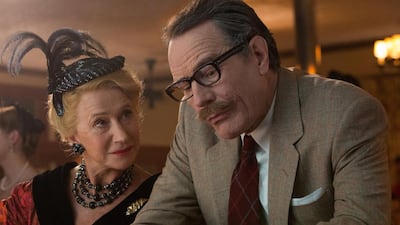Trumbo
Director: Jay Roach
Stars: Bryan Cranston, John Goodman, Diane Lane
⋆⋆⋆⋆
Sitting in a bathtub with a pen in one hand, a drink in the other and a cigarette holder dangling beneath his wiry moustache, Dalton Trumbo wrote countless Hollywood screenplays.
From cheap B-movies to Oscar winners, he remained prolific throughout his career, even during the 13 years he was blacklisted for being a Communist. He even stood up to the threat of imprisonment for his principles – that Americans have the right to hold whatever political beliefs they want without government retribution.
He subsequently worked constantly and defiantly – but at significant personal and professional cost.
You don’t have to know a thing about the writer, Hollywood or Communism to enjoy Trumbo. A biopic lovingly rendered with input and approval from his daughters, Trumbo is about an idealistic, imperfect man who stands up for what he believes, even when it means risking what he holds most dear.
The script is funny and fascinating, the acting outstanding. In the title role, Breaking Bad’s Bryan Cranston gives a performance as compelling and complex as the man himself. Cranston’s Trumbo is eminently interesting, from his rounded posture and curious eyes to his distinct cadence and diction.
The ensemble supporting cast is also excellent. As Trumbo’s wife, Cleo, Diane Lane embodies quiet strength, conveying heartbreak, pride and concern.
Louis C K plays Trumbo’s friend Arlen Hird, who delivers sharp one-liners and clever retorts. Dean O’Gorman is uncanny as Kirk Douglas, right down to the chin dimple, while Helen Mirren’s grounded performance keeps outlandish gossip columnist Hedda Hopper from becoming a caricature.
John Goodman steals all his scenes as B-movie producer Frank King.
The story begins in 1947, when Trumbo, a labour-union supporter, would meet friends to discuss political and social ideas. Trumbo had become a Communist after the Great Depression and his group was concerned about the state of the country.
The US government, meanwhile, was increasingly fearful of the rise of “the red menace” and considered movies one way in which Communists were conspiring to control American minds. The House Un-American Activities Committee called on Trumbo and others to testify about their political beliefs and identify colleagues who might be Communists.
Trumbo declined to name names and ended up paying a heavy price for his failure to comply. Others did name names, and those associated with Communism were suddenly unemployed.
The industry policed itself through the Motion Picture Alliance for the Preservation of American Ideals. John Wayne (David James Elliot) was its leader and gossip columnist Hopper its unofficial enforcer.
It’s an enthralling story about how far government, industry and individuals might go to uphold what they believe is right – and how far people of principle who know it is wrong will go to stand up to them.
* Associated Press

